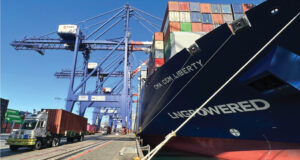Despite the U.S. Customs and Border Protection’s embrace of technology, there remains a strong need for a trained, professional workforce at the seaports. To fill these vacancies and in anticipation of receiving future funding for even more positions, CBP is aggressively recruiting at all ports, including seaports.
* By Todd C. Owen, U.S. Customs and Border Protection *
United States Customs and Border Protection (CBP) carries out a complex, important mission at the nation’s sea ports of entry (POE). CBP has a primary mission of keeping terrorists and their weapons out of the U.S., but CBP also has the responsibility for securing and facilitating trade and travel while enforcing hundreds of U.S. regulations, including immigration and drug laws. CBP’s Office of Field Operations (OFO) is the law enforcement component within CBP responsible for carrying out CBP’s complex and demanding border security mission at all POE, including over 70 international seaport locations. Through its workforce of over 30,000 employees, including more than 23,000 CBP officers (CBPOs) and 2,400 CBP agriculture specialists (CBPAS), OFO manages the lawful access of people and goods to our nation by securing and expediting international trade and travel.
During the most recent fiscal year at the sea ports, in carrying out its mission CBP inspected and cleared over 20 million crew and passengers on arriving vessels, over 125 thousand foreign vessels and over 13 million arriving containers. Continued growth in international trade and travel continues to strain CBP resources and CBP’s efforts to secure the homeland. CBP has seen tremendous growth in workload at the nation’s seaports. Over just a four year period, from fiscal year (FY) 2013 to FY 2017, CBP has processed nearly 15 percent more arriving sea passengers and crew and 24 percent additional full sea containers.
CBP has been leveraging leading edge technology to manage this growing workload as efficiently as possible. CBP employs large scale non-intrusive (NII) technology systems to provide visual representations to compare against declared cargo manifests. NII technology is designed as a tool in the entire layered inspection process. Although NII is a critically important component of the CBP layered enforcement strategy, CBPOs must rely on other elements by which to make a final determination as to releasing cargo or conducting more extensive examinations.
 AAPA Seaports
AAPA Seaports



